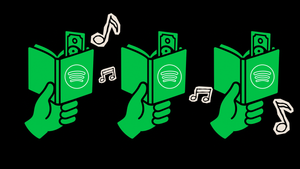Spotify has responded in bombastic form to the revamped lawsuit filed against it by The MLC over its use of the bundling discount in the compulsory licence that sets what streaming services must pay songwriters and music publishers in the US.
It disputes new complaints made by The MLC, while also questioning the motives of the mechanical rights collecting society in proceeding with the litigation.
That lawsuit originally centred on whether or not the main Spotify Premium subscription qualified for the bundling discount now that it offers users access to both music and audiobooks. Spotify said it did, The MLC said it didn’t. Earlier this year a judge sided with Spotify in what the streaming service dubs “a decisive defeat” for the collecting society in a new court filing.
The revised lawsuit is focused on whether or not Spotify is applying the discount correctly. Spotify says it is, The MLC says it isn’t. In its new filing, Spotify says The MLC’s new complaints are “unsupportable by the facts”, but even if the society’s claims were correct, these are “peripheral issues” that won’t result in any “dramatic increase in royalty payments”.
Which, Spotify then states, “raises serious questions about MLC’s motivations in continuing to spend resources on this litigation”.
And while you could argue it’s not for Spotify to question the MLC’s motives, the collecting society’s operations are funded by the streaming services, which means Spotify is effectively paying to sue itself - or at least contributing to the costs of the lawsuit being filed against it.
Spotify added fifteen hours of audiobooks access to its Premium subscription product in 2023 and then started applying the bundling discount available under the US compulsory licence the following year, significantly reducing the royalties it pays to writers and publishers via The MLC.
That prompted an angry response from the songwriting and music publishing communities, who argued Spotify had cynically reclassified its Premium product simply to reduce royalty payments, even though Spotify’s premium subscribers had all signed up for music and were given audiobooks access without asking for it.
Which meant there was a lot of support within the music industry for The MLC’s litigation. It argued that to qualify for the bundling discount, the audiobooks access that was now part of Spotify Premium had to have more than ‘token value’, which it didn't because Spotify’s premium subscribers had all signed up for music. But the judge rejected that claim.
However, the judge accepted that a legitimate dispute remained regarding how Spotify applies the discount, and therefore allowed an amended lawsuit to be filed.
In order to calculate what it owes writers and publishers on a bundled subscription, Spotify first has to allocate a portion of the premium subscription price to music and a portion to the audiobooks. The percentage royalty rate for writers and publishers contained in the compulsory licence is then only applied to the portion allocated to music.
To help with that process, Spotify set up a standalone audiobooks subscription product offering fifteen hours of audiobooks access for $9.99. That product is only available in the US and hasn’t really been marketed by the streaming service, meaning it only really exists to justify Spotify’s maths when calculating what it needs to pay writers and publishers.
The MLC argues that Spotify’s audiobooks only product is over-priced at $9.99. Plus the audiobooks product comes with ad-supported music, so is in itself a bundle, meaning not all of that $9.99 can be allocated to the audiobooks.
But, insists Spotify in its new filing, “$9.99 is, if anything, a conservatively low price” for its standalone audiobooks product, because rival services offering access to “the equivalent range of bestsellers available on Spotify” cost more than $9.99 a month.
The bestsellers point is key here. Amazon does offer its Audible Plus audiobooks subscription at $7.95 a month with unlimited listening, but - argues Spotify - “it gives access to virtually no bestsellers”.
Audible Premium Plus, which also includes access to one ‘premium’ title a month, is $14.95. Given the Author Learning Center estimates that the average audiobook lasts eleven hours, Spotify is basically offering you access to one bestseller title and a little more each month for $9.99.
As for the argument that Spotify’s audiobooks product is actually a bundle, because it includes ad-supported music, that’s not true according to the compulsory licence’s definition of bundle, the new filing insists.
A bundle is a combination of a “subscription” music offering plus some other product. But that ad-supported music is basically the Spotify free tier which, as far as the streaming service is concerned, is “a nonsubscription music offering”.
Concluding, Spotify says that only “limited discovery” should now be allowed in this dispute - which means a limited exchange of documents between Spotify and The MLC - because that process, it reckons, will “dispositively demonstrate that MLC’s new claims are as baseless as the one that this court already rejected”.

